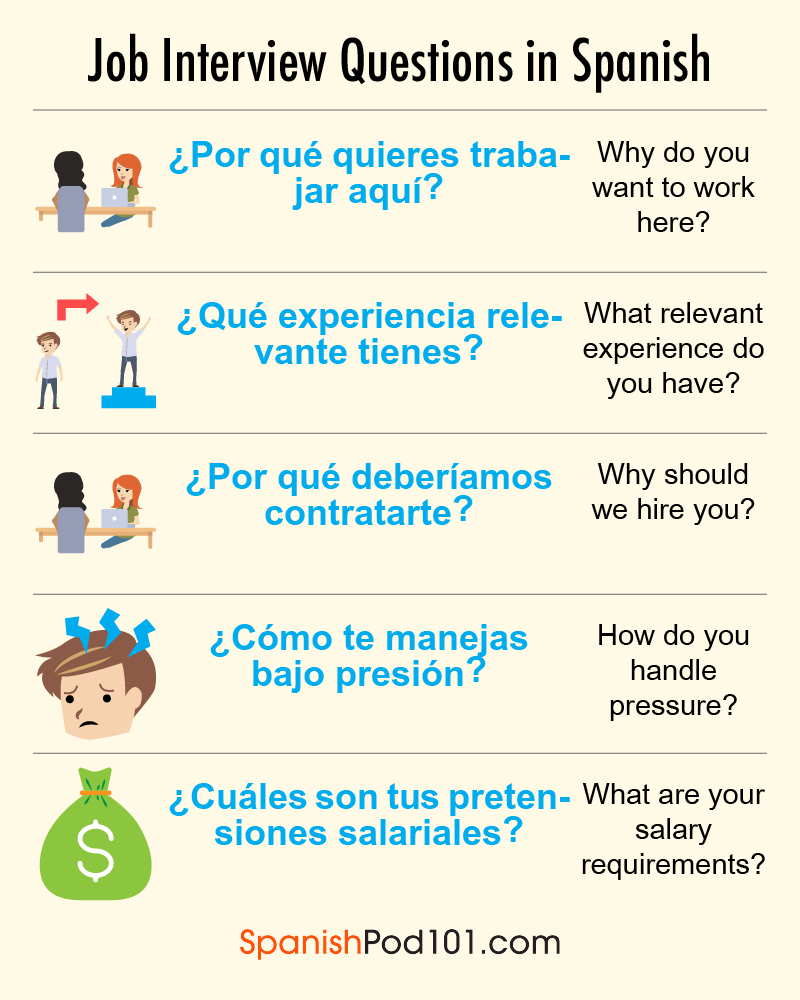One of the most common reasons to start learning a language is the motivation of moving to a different country and working there. Today at SpanishPod101.com, we’re going to talk about why you should consider moving to Spain and how to find a job there, as well as teach you a few basic facts, such as how to say “job” in Spanish, and more.
We’re not going to lie: In the past, getting a job in Spain hasn’t been as easy as we’d have liked. However, we have good news. The situation has actually been improving over the past two years. According to Trading Economics, in July 2018, the general unemployment rate in Spain was 15.3%. It sounds bad, but compare it to the rate in 2015 and 2016, which was around 21%. Definitely some improvement there.
There’s no need to worry about any of this right now, even if you’re not fluent in Spanish or don’t speak it too well yet. And to show you that it’s possible to find a job in Spain, we’re going to tell you everything you need to know if you want to work here, including how to the find the best foreigners-friendly jobs in Spain.
Start with a bonus, and download the Business Words & Phrases PDF for FREE! (Logged-In Member Only)
Table of Contents
- Five Reasons Why You Should Move to Spain
- What You Need to Know Before Applying for Jobs
- How SpanishPod101.com Can Help You Find a Job in Spain
1. Five Reasons Why You Should Move to Spain
Just in case you’re not convinced yet, we thought we’d give you a few reasons to relocate to Spain. We think you’re going to like them.

1- The Food
Surely you’ve heard about Spanish food before, and probably even tried some. Paella, churros, gazpacho, jamón…these are just a few examples of the amazing food we have in Spain. So, why not live there so that you can eat it all the time?
2- The People
Spanish people are widely known for being friendly. If you’ve ever visited our country, you’ll know this is true. Everyone is welcoming and open-minded (as long as we’ve had our siesta after lunch). And if you love a good party, you’ve come to the right place. There’s nothing like the local fiestas that take place in each town at least once a year. Trust us, you’ll hear about them once you’re there.
3- The Cost of Living
Spain is so much cheaper to live in than a lot of other European countries. The most expensive Spanish cities are Barcelona, San Sebastián, and Madrid, and if you check a list of the most expensive cities in Europe, you’ll see they’re around the 50th position, so they’re pretty great compared to most of the nearest countries.
4- The Healthcare System
Every legal immigrant working in Spain has access to the public healthcare system as soon as they register for an NIE, which basically serves as your personal ID. As a Spaniard who has traveled a lot, this is definitely one of the best healthcare systems I have come across in my life.
5- We have Everything You’re Looking for
Basically, everything you need in your ideal city, you can find here. Do you want city? Check. Do you want beach? Check. Do you want mountains? Check. Sometimes you might even find all these things in one place, so just be sure to choose the right location for you.
There are many more reasons to convince you to move to Spain immediately, but I’ll leave them to you to find out when you arrive. That said, I think you see that there are many benefits of working in Spain that you won’t want to miss out on.

2. What You Need to Know Before Applying for Jobs
Now that you know why moving to Spain is a good idea, it’s time to help you find a job. To get you started, you should know that the word for “job” in Spanish is trabajo, empleo, or, in more informal contexts, curro. Two of these words have their respective verbal forms: trabajar and currar (“to work”). Again, currar is way more informal than trabajar, but both are widely used. Now that you know this, let’s get you a curro!
1- Spanish CV Tips
The first thing you should do before starting to apply for jobs is to write your new Spanish CV. Most resumes and CVs are similar in different countries, but there are always a few differences, so we recommend starting a new one from scratch. Here are some things you should keep in mind:

Include a photo
In a Spanish CV, it’s important that you include a professional photo of yourself. You can use the same photo you use for your passport or your driver’s license.
What language should you write it in?
Ideally, your CV should be written in Spanish. However, if you’re applying for a job that doesn’t require it or are looking for jobs for non-Spanish speakers in Spain, you can submit it in English.
Your personal information
The first part of your CV should include your basic personal information: name, last name, date of birth, address, email address, and phone number. It’s also common to include your marital status, but it’s not compulsory.
Your studies
The next section can either be about your education or your work experience, as the order isn’t too important here. You should list your studies in reverse-chronological order, starting with the most recent, including the institution and the location. You can choose to include the dates you started and finished each of them, but it’s not necessary. It’s up to you, really. If you can, you should include the equivalent of your qualifications to Spanish education.
Your work experience
As we said in the previous section, you can choose this section to be either about your education or your work experience. So if you listed your studies in the previous section, now it’s time to show your future employers what your past work experience is. You should also list them reverse-chronologically and starting with your most recent position. In this case, it’s common to include the dates. You don’t need to write anything about that position, unlike in some other countries. All you really need are the dates, your position in the company, the name of the company, and its location.
Languages
You should include a section listing the language or languages you speak, and your level of fluency. If your Spanish isn’t great or you don’t speak it (yet!), you should focus on the other languages you do speak.
Hobbies
This one is optional and might not be as common in other countries, but it’s really frequent in Spain to list some of the things you enjoy doing in your free time. For example, if you enjoy hiking or listening to music. This last section of your CV is also where you let them know if you have a driver’s license.
2- Six Most Common Job-Seeking Platforms to Find a Job in Spain

Once you’ve completed your CV and your cover letter, you can start spreading them around. There are two basic ways of applying for jobs in Spain: using job-seeking platforms or giving CVs in person. Of course, nowadays everything is online, so it’s getting more and more common to only apply for jobs through these platforms. The only problem is that most of these sites are only in Spanish, so you’ll need to know at least a little bit of Spanish. Here are the most popular Spanish job hunting sites:
Infojobs
Infojobs is definitely the most-used website for finding jobs in Spain, and the one that everyone would recommend.
Infoempleo
This website, Infoempleo, is the second most-used Spanish job seeking website and we highly recommend it.
Primer Empleo
The name of this platform, Primer Empleo, means “First Job.” It’s not exclusive to people who have never had a job before, but it’s mostly focused on jobs for students or those who don’t have too much experience.
Empléate
This is the Government of Spain’s official website for finding a job and, to be honest, it’s not as commonly used as the previous websites we mentioned. However, it’s still safe and worth considering as a Spanish job-finding website.
You probably already know LinkedIn, but if you don’t, we recommend you check it out. Basically, it’s a social network for employers and workers to create professional connections all over the world, and it’s also highly used in Spain.
European Language Jobs
Just like LinkedIn, this one isn’t an exclusive Spanish website, but it might actually be the most useful for non-Spanish speakers. They post job offers for speakers of different languages in various European cities. If you click on the link to the website, you’ll find all the current job offers in Spain, so all you need to do is find your language.
3- Easiest Jobs for Non-Spanish Speakers
As we mentioned before, and you probably already guessed, there are some jobs that require you to speak Spanish, but there are some others that might be easy for Spanish beginners. On the website we were just talking about, European Language Jobs, you’ll find offers for jobs that require knowledge of and fluency in languages other than Spanish. It’s definitely not the only website where you can find non-Spanish speaking jobs in Spain, so just be sure to do some research!
Here are some other options that foreigners finding jobs in Spain can try out to begin with:
Language teacher
Are there people who are interested in learning your mother tongue? If so, you already have a possible job in Spain. If you don’t feel comfortable enough to fully teach your native language, you can still offer conversation-based lessons, which is an option many language-learners choose, especially in advanced stages.
Tourism
In the most-visited cities, you’ll easily be able to work in the tourism industry, as they’re always looking for people who speak foreign languages. Of course, speaking Spanish is still desirable, but in certain positions, your native language might be more important.
Office jobs
Not every kind of office work will be suitable for a non-Spanish speaker in Spain, but you can certainly find some. They’ll mostly be foreign-based companies that also have an office in Spain.
4- Five Common Interview Questions in Spain

Once you’ve applied for jobs, it’s time to do some interviews. In a job interview in Spain, a lot of the questions you’ll be asked are about yourself, and not just about your work experience and qualifications. Here are five examples of questions you’re most likely to be asked, in Spanish, and followed by their translation in English.
Háblame un poco de ti. — “Tell me a little bit about yourself.”
The first question on our list isn’t actually a question, but it’s definitely something you’ll hear in an interview. To answer it, you should briefly explain your work experience and studies. You can also explain why you decided to move to Spain, if you think that might interest them.
¿Dónde te ves en cinco años? — “Where do you see yourself in five years?”
What the interviewer wants to know is whether your plans for the future match their plans for you. If you tell them you’re only thinking of working in Spain for a short period of time, they might not be as interested in you as they would be if they knew you’re planning on staying there for a long, long time.
¿Cuál es tu mayor virtud? — “What is your best quality?”
This question might differ a little. They could ask you about only your best quality, or about your three best qualities, for example. When answering this, you need to be realistic and tell them about a skill you know will make a good difference in the position you’re being interviewed for. Before going to your interview, think a little bit about what you’ll say.
¿Cuál es tu mayor defecto? — “What is your worst quality?”
This one is also a hard question. You obviously want to look good even after answering this question, but we recommend you don’t answer with something like “I’m too much of a perfectionist,” because even if you are, they won’t believe you. Just like in the previous question, you need to think about the right answer for this question and be realistic. You could mention something that’s been hard for you in the past, but that you’ve been working on to improve, and give specific examples for it if you can. To give you an example, a good answer would be that you used to be slightly unpunctual, but for the past few years you’ve been paying much more attention to it and are always on time now.
¿Por qué deberíamos contratarte? — “Why should we hire you?”
This one isn’t as common as the other four questions, but it’s still an important one and you should know how to answer. Your answer will depend on the kind of work that you’ll be doing, but obviously it should be focused on everything you can contribute to the team.

5- Full-time and Part-time Jobs
In Spain, both full-time and part-time jobs are equally frequent to find on the main job-seeking platforms. A common full-time job in Spain, or trabajo a tiempo completo, has an average of nearly 40 hours per week.
However, if you get a part-time job, or trabajo a tiempo parcial, you’ll generally work about six hours a day.
Both types of jobs offer you the same rights as a worker. This means that if you get a part-time job, no matter how many hours you work, you’ll still have full free access to the public healthcare system, for example. This makes working in Spain quite convenient in terms of healthcare, and we should all know how important that is.
6- Working Visas for Non-EU/EEA or Switzerland Citizens

If your passport says you’re from a country in the EU or EEA, or from Switzerland, you don’t need to worry about getting a visa; you can just fly to Spain and start working. It’s as simple as that. However, if you’re from any other country, you’ll need a valid working visa, and that does require some paperwork. Here, we’ll go into a little detail on the visa requirements to work in Spain.
You cannot apply for this visa directly, so in order to get it, you’ll need to find a job first, and then your employer will have to start doing the procedures for you so that you can receive a Work and Residence Permit. Once you have this permit, you can apply for a Work Visa. Your employer in Spain should be able to help you with this whole process, but if they can’t, don’t hesitate to contact your nearest Spanish Embassy or Consulate.
7- Minimum Salary
The minimum salary in Spain was raised to €735.90 per month or €24.53 per day in 2018 from the €707.60 per month or €23.59 per day that was in place in 2017. In 2016, the minimum monthly salary was €655.20 and it had been growing really slowly over the last ten years, so this is a great time to relocate to Spain.
We realize it might not seem like too much, but remember this is only the minimum salary, so you’ll be making more money if you get a job with higher qualifications. You must also keep in mind that the cost of living is way cheaper than in most European countries, as we said previously in this article.
8- Something Else You Should Know
Just like everywhere else, to find a job in Spain, it’s important that you have qualifications, experience, confidence, and possibly speak more than one language.
In case you didn’t know, Spanish isn’t the only language spoken in Spain. There are a few regions in Spain that have co-official languages. If you go to cities like Barcelona, Valencia, Santiago de Compostela, or Bilbao, among others, you’ll hear languages other than Spanish, and we’re not just referring to the tourists. When applying for a job, speaking these regional languages is considered a positive trait, but normally they’re only required in public administration jobs.
3. How SpanishPod101.com Can Help You Find a Job in Spain

At SpanishPod101.com, you’ll find everything you need to learn Spanish, whether you’re just getting started or are at a more advanced level.
If your dream is to live and work in Spain, we’re sure you already know that you should learn some Spanish before moving there. Like we mentioned before, you can still get a job if you’re not fluent or if you don’t speak too much Spanish, but your options will be much more limited, so you know what to do!
Check out SpanishPod101.com’s vocabulary lists, such as the Top 15 Spanish Questions You Should Know for Conversations, or some useful learning tips like Top Ways to Practice Your Spanish Reading Skills.
We hope this article provided you with all the info you need about working and living in Spain. Thanks for reading, and best of luck with all of your Spanish job-hunting endeavors!










